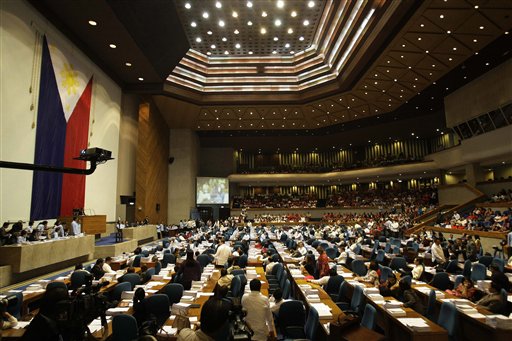House adopts Senate-approved Anti-Financial Account Scamming bill

The House of Representatives. INQUIRER FILE
MANILA, Philippines — The House of Representatives has adopted the Senate’s third reading version of the proposed Anti-Financial Account Scamming Act (AFASA) in place of House Bill (HB) No. 7393, which means the bill can now be forwarded for President Ferdinand Marcos Jr.’s signature.
During the session on Wednesday, the House Majority moved to use Senate Bill (SB) No. 2560 as the final version of HB No. 7393 — a similar measure approved by the House last May 2023.
The Senate passed SB No. 2560 last Monday, before the Senate changed leadership.
Under SB No. 2560, the following activities are considered illegal acts:
- Money Muling Activities – A person performing any of the following acts for the purpose of obtaining, receiving, depositing, transferring, or withdrawing proceeds that are known to be derived from crimes, offenses, or social engineering schemes shall be considered as a money mule:
(1) Using, borrowing or allowing the use of a Financial Account
(2) Opening a Financial Account under a fictitious name or using the identity or identification documents of another
(3) Buying or renting a Financial Account
(4) Selling or lending a Financial Account
(5) Recruiting, enlisting, contracting, hiring, utilizing or inducing any person to perform the acts mentioned in items 1 to 4 of this subsection
- (b) Social Engineering Schemes. – A social engineering scheme is committed by a person who obtains sensitive identifying information of another person through deception or fraud, resulting in unauthorized access and control over the person’s Financial Account, by performing any of the following acts:
(1) Misrepresenting oneself as acting on behalf of an Institution, or making false representations to solicit another person’s sensitive identifying information
(2) Using electronic communications to obtain 8 another person’s sensitive identifying information
- (c) Economic Sabotage. – The prohibited acts under 10 Section 4(a) and (b) shall be considered as economic sabotage when committed under any of the following 12 circumstances:
(1) By a group of three (3) or more persons conspiring or confederating with one another;
(2) Against three (3) or more persons individually or as a group
(3) Using a mass mailer
(4) Through human trafficking
READ: Anti-financial scamming bill pushed
The AFASA bill is one of the priority bills of the Legislative-Executive Development Advisory Council (Ledac), forming part of President Ferdinand Marcos Jr.’s legislative agenda.
As of March 19, 2024, Speaker Ferdinand Martin Romualdez said the House has finished approving all Ledac-priority bills and other proposals mentioned by Marcos in his previous State of the Nation Addresses.